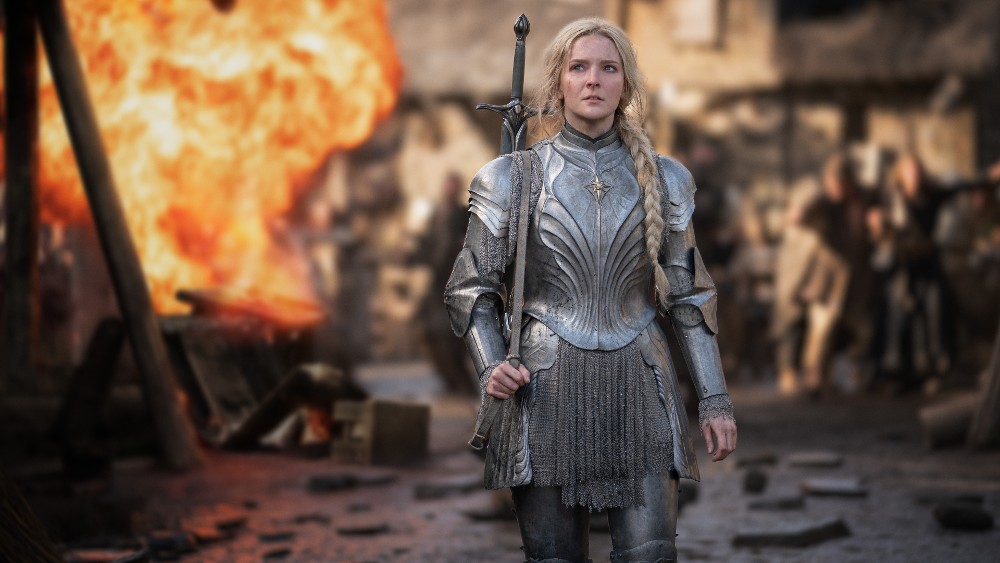
Composer Bear McCreary has been scoring music for television and film for over 25 years. He is no stranger to fans of genre television, having written the music for most of the Battlestar Galactica series from the 2000s, then jumped onto equally beloved series like Outlander and The Walking Dead.
Taking on the score for The Lord of the Rings: The Rings of Power was a dream come true for McCreary, but the biggest challenge for that gig may have been the amount of music that needed to be written. All eight episodes at an hour apiece have almost as much music, leading each episode to have its very own soundtrack record. And that was while still scoring The Walking Dead and a half dozen other projects.
Below the Line spoke with McCreary over Zoom to discuss what went into making all that music for the Prime Video series that already would have a built-in audience of Tolkien fans, but one that can be quite picky about maintaining accuracy to Tolkien’s words. McCreary is incredibly lively, and loves talking about his craft, going by the blog posts he writes giving insights into his process.
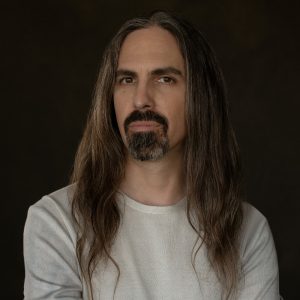
Below the Line: Rings of Power was a lot of music, literally eight hours, but I’m not sure I realized you were still doing Walking Dead at the same time. Taking this on, are you just a giant Tolkien fan, and this was something you just had to do?
Bear McCreary: I did this, because this is like a lifelong dream for me. I grew up on Tolkien’s writing, and, of course, adored the Peter Jackson films as they came out. This is something that I had always drawn influence from when I was working on other projects and telling my own stories. The opportunity to actually contribute to part of Tolkien’s own legendarium and score major events of the Second Age, it was a dream come true.
For me, it was the easiest decision ever. It really just presented logistical challenges for my life … [like] my sleep schedule. After the initial decision was made, the harsh reality of what I’d committed to began to sink in, but the moment the show was announced, years ago, I thought that I really would love the chance to be involved.
BTL: At what point did you start getting scripts? Were you already thinking about themes and melodies even before reading anything?
McCreary: Scripts are very helpful. It helps me wrap my brain around what is coming, but the truth is that film is a visual medium, and I am a very visual writer when it comes to music. I can’t really write themes until I see it. Who are the actors? What do they look like? What does the show look like? What does the art design look like? What is the flow of editorial? I think maybe more than any other show I’ve worked on, I could read the scripts for the Rings of Power, and drawing from my knowledge of the books and the Peter Jackson films, there’s an aesthetic that we’re referencing, so I had some influence.
But really, I couldn’t really get started until I could see it. My mentor was a composer named Elmer Bernstein, one of the greatest of all time. He used to say that a film tells you what it needs. He would watch a film a dozen times before going to the piano, and he said that after a while, it started to tell him what it needs. I do share that philosophy, and in order for a film or a show, to tell you what it needs, you have to look at it.
BTL: From the composers I’ve spoken to, including many Oscar winners, they can tell automatically if they’re watching something with temp score that just isn’t working. I guess that’s the case with you as well, or did this never even get to the point of temp score?
McCreary: Oh, no. Temps scores are fantastic. An editor and a filmmaker have to use temp score. Look, if someone wants to use temp score, I won’t judge them in any way. If that’s the way they communicate their ideas, it’s very helpful. Sometimes, a temp score works, sometimes it doesn’t. The best case scenario is you’re working with filmmakers who understand that.
I find that a filmmaker who has struggled with a temp and can come to me saying, ‘I know this isn’t working. We’ve tried temping it with 100 things and I don’t know what to do,’ they’re often in the best mental space to hear new ideas. Because they’ve tried it. They’ve heard that scene with 100 different drafts, the 100 and first one will be one that was custom-tailored for their drama by a composer. In a way, it almost makes it easier.
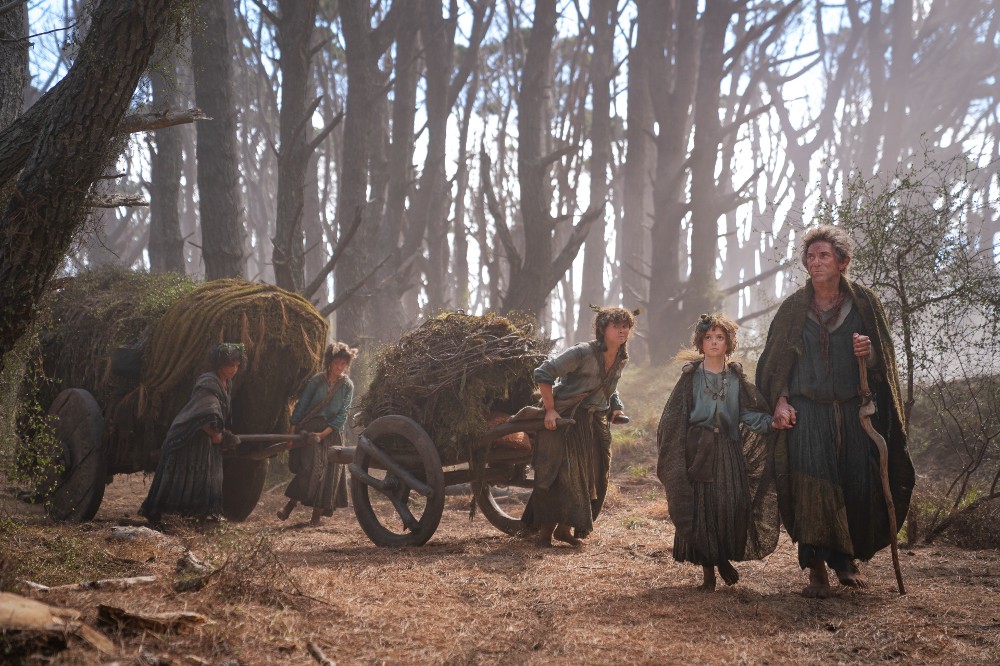
BTL: When I asked the guys at Tutti, they suggested I ask you, and that’s what I’m going to do now, but were there any aspects of Howard Shore’s score sprinkled throughout the show?
McCreary: None. I was not allowed to use them, so there were none used. In a way, it was a blessing in disguise. If we were allowed to use them, it would have been incredibly tempting. It would have been like the Ring itself, the temptation, the leaning on this nostalgia!
Truly, there are only a handful of themes that would have been even appropriate, narratively. The “One Ring” theme would have been great, but without having access to that, I created a new theme that is actually tailored for the narrative purpose in the Rings of Power, and it’s much more complicated. We find out about this substance called Mithril, and from there, we meet a guy named Celebrimbor, and this builds and builds and builds and builds. Even by the end of the first season, he makes three rings, not the one ring.
You can understand how if the nostalgia adrenaline bolt was reminding you of the Peter Jackson movies at every step, it would have been jumping the gun, and ultimately would have been a crutch that the audience would have been annoyed by the end of the first season. You don’t have the “One Ring,” why are we hearing this thing?
Another great example: fans were asking me at one point early, before the show premiered, they were wondering if the theme for Númenor would sound like Gondor? Well, I understand that impulse Gondorian society has descended from Númenorian society, but we’re talking thousands of years later. That would be like if you made a movie that took place in New York City today, and then you said to the composer, ‘Well, obviously the music should sound like Mesopotamian Society.’ It’s different, and in a way, being forced to create something new, being put out of that comfort zone, I think really kept me on my toes.
I’m not trying to match Howard’s score. I’m not trying to outdo it. I’m trying to introduce it, try to key it up, so that you watch our show, and then you go into the Peter Jackson films, and you’ll feel this sense of continuity. “Continuity, not quotation” was the motto that I kept telling myself. To help, we had this incredible main title theme that Howard Shore actually wrote for us, which also creates this beautiful continuity. That was, I thought, a cool experience.
I do believe that of the 17 themes that I wrote in the first season, I think a handful of them really are memorable. I hope that years from now, when people binge-watch this entire experience that among Howard’s legendary themes, that they might have the Stranger theme stuck in their head. They might have the Númenorian theme stuck in their head, that would be pretty cool.
BTL: I’m also curious about some of the songs you did. You did one with Fiona Apple and a couple with other singers, so for those, were you generally involved with all aspects of the production, recorded them in your own studio, etc?
McCreary: Generally, yes I am, and in the Rings of Power, it was a bit of an exception. Because of COVID, the composer was hired later in the process, so I wasn’t involved in “This Wandering Day,” because they wrote that song before I was hired, but I produced the recording and wove it into the score. The Fiona Apple song, that was me. That was done entirely in post-production, and in Season Two now, I am more involved in all the songs.
I love being involved in the songwriting. It’s not a given that a composer who is doing dramatic scenes is going to be that. Many composers don’t have the inclination or experience. I just really enjoy it, so at any opportunity to collaborate with singers. I collaborated with Sophia Nomvete to do her Dwarven singing, for example. I leapt at that opportunity, and it’s written into the text from Tolkien himself. The songs are a big part of this world.
When I came on board, “This Wandering Day” was already woven into the DNA of the season, and I was really excited about that. I also wanted to do the Ring verse. That one was me pitching them a song for the end of the show. Thankfully, we got to work with Fiona Apple, who did this brilliant performance, absolutely brilliant, so that was a real honor. I imagine you might hear more of that next season.
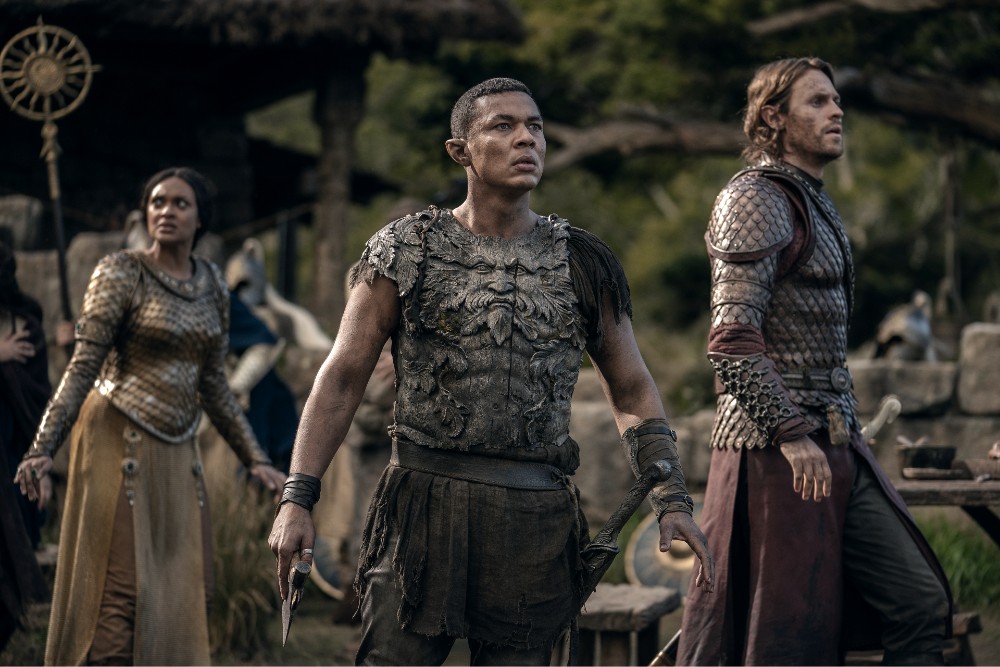
BTL: Since some of the vocals are in Elvish and other Tolkien languages, do you learn the languages or did you already know it?
McCreary: I already know it. I have become very familiar with the various languages, and there are five that are written into the text for the score: two elvish, Black Speech, Dwarvish and a Númenorian language. But Quenya being the predominant Elvish language is the one that we hear the most. It’s interesting, because it is a functioning language and one could learn it – I haven’t – and you could say anything in it. I have chosen to keep the text in the choir writing for the soundtrack limited to words that Tolkien crafted himself. The lexicon is quite limited, especially for Black Speech, and Dwarvish. I mean, there are just a handful of words.
In future seasons, I might expand our lexicon of words, because we just need to say more. But that was fascinating, learning how these words are said, what they mean, and integrating them into my writing. I think I’ve buried the headline that every time you hear a choir singing text in the Rings of Power, they’re singing text that is crafted for that scene for those characters in a language that is appropriate for the context. That itself was a Herculean task, to pull that off. We did something similar on God of War. I just posted a blog entry about that process alone, and the Rings of Power was even more complicated.
BTL: Are you collaborating with the writers or showrunners on what words for the choir sing, or do they leave it up to you?
McCreary: Oh, no, they’re very involved. In fact, I gotta say that of the two showrunners, JD Payne in particular, his passion is music. His wife is an opera singer. He understands music, and he understands text in this beautiful way that, despite how busy he was – writing scripts for season two, supervising cuts for season one – he was also taking time to look at the text. We would send him text from cues. ‘We’re recording choir and the next couple of days. Here’s the text that we’ve laid out.’ And he would write back questions like, ‘Isn’t that word Sindarin? Shouldn’t we make sure that’s a Quenya word? Because if that’s the scene, I think it is,’ and we’re like, ‘Yup, thank you!’ He understands it better than anybody. He also writes lyrics. He wrote the lyrics to “This Wandering Day,” so It’s fascinating seeing his passion for it, even though this is a guy that is doing a lot of aspects of production as a producer and a writer. That was great, and it set the template for how to do this moving forward. In the second season, all those lyrics have been written in advance, which is great. We wrote in advance a whole bunch of text all ready to go now, so it’s gonna be really exciting.
BTL: Kind of branching off from my earlier question, are you a knob-twiddler? Are you a composer who will sit at a computer and tweak EQs and things like that, or do you bring the score to the recording studio and let others handle that aspect?
McCreary: I’m a bit of a chameleon. I’m definitely all of the above. Everything you’re hearing is recorded live, more or less. Certainly, the orchestra is all live. I don’t keep any sampled instruments in there. I also make extremely detailed mock-ups, and within those mock-ups are extremely detailed production tracks that will stay in there. A lot of the production for percussion I do in my studio, I do with sampled custom instruments that I’ve made myself, that my team has made for me. Over the years, my entire digital working environment is custom, and everything is bespoke. In that regard, yes, I am very particular, and when you hear mock-ups from me, you’re hearing what the music is going to sound like. It takes an attention to detail that’s extreme for that to be the case.
With that said, the orchestra always brings more. Live soloists always bring more. I’ll sketch out what the Nyckelharpa and the Hardanger fiddle are going to play. But you get people on those instruments that grew up playing it, and they bring with them their cultural heritage that those instruments connect with. You get music that is more rich. You get performances that are more nuanced and layered.
For me, that happy medium is being detail-obsessed with my production and my writing, but always having room for letting other musicians do what they do best. Because the music always benefits from that.
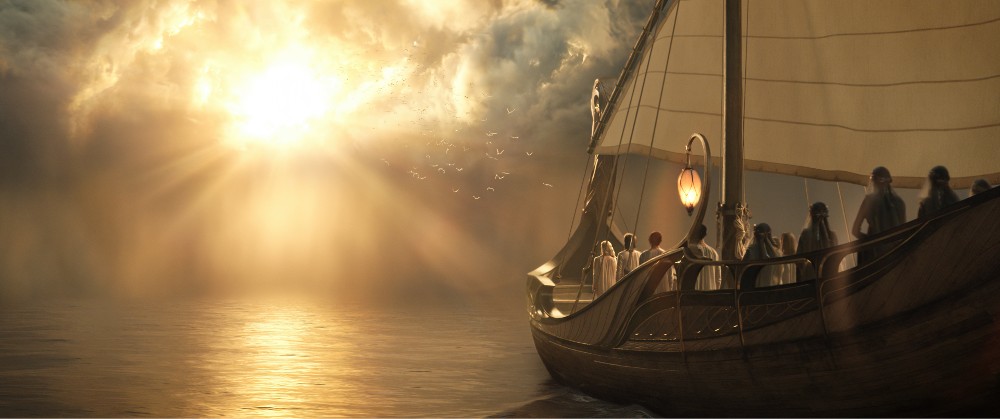
BTL: Since this interview is for Emmy consideration, I’m curious what episode or episodes you’re submitting out of the eight hours of music you composed?
McCreary: We’re submitting the first one, which I think gives voters a chance to wrap their heads around the scale of this score. It’s tough because you don’t hear Khazad-dûm, you don’t hear Númenor. There’s a lot of stuff you don’t hear, but at the end of the day, the theme for Galadriel, for Elrond, for Valinor, and that moment in the end, when she almost breaks the fourth wall and looks into the lens as she decides what she’s going to do on the boat. That moment, they let me go so big, so operatic, I thought that’s a moment I think would resonate with Emmy voters if I didn’t know what Lord of the Rings was, and I didn’t know who Galadriel was, and I actually watched that hour of storytelling, I think I would really feel something. That’s one of my favorite moments, and for that reason, I thought we should submit the first one.
All eight episodes of the first season of The Lord of the Rings: The Rings of Power are available to watch on Prime Video, and all nine soundtrack albums are also available on streaming and other formats.





